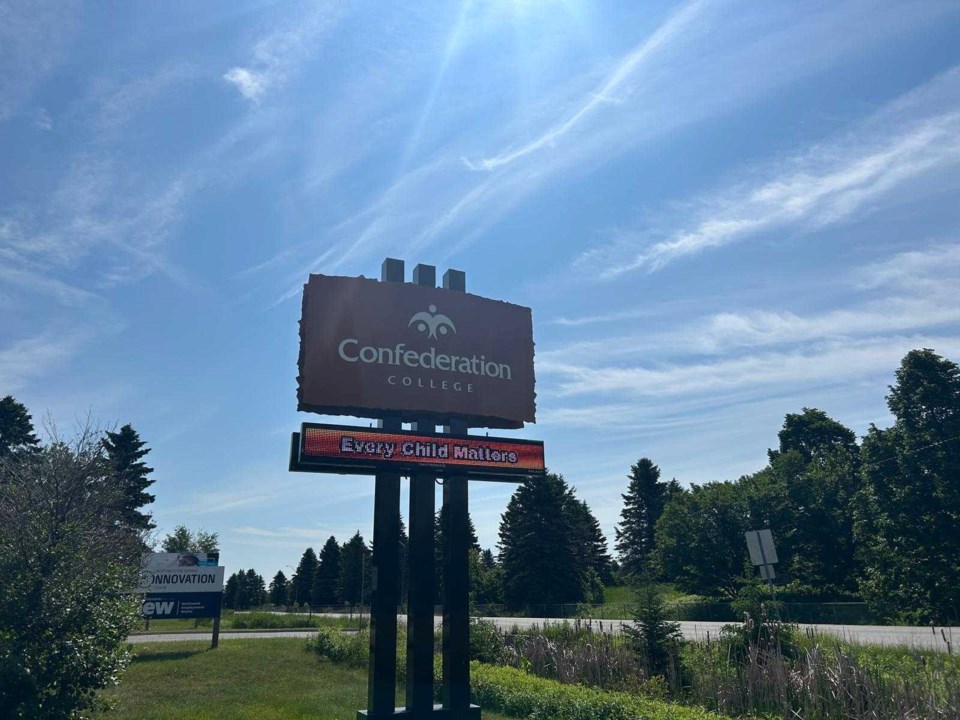THUNDER BAY — Confederation College has launched its Indigenous Reconciliation Action Plan, providing staff and students with a road map for its multi-year commitments to truth and reconciliation.
“For students wanting to come to Thunder Bay, that might be from outside the city, we want them to know that we're creating a safe space here in the city of Thunder Bay for them to come and successfully study, be part of the community and be successful,” Wendy Landry, the college’s vice president of Indigenous leadership, partnerships and strategies told Newswatch in an interview Thursday.
“And whether they go back to their own communities or to a different town or city or stay here, that they're wanted, they're safe and we want to create that exceptional space where we can all come together and move forward in a good way.”
College president Michelle Salo agreed that making an open, caring environment for students and staff who may be Indigenous is important.
With Indigenous communities surrounding all on the college's campuses in the region, she said it's very important that these cultures are embedded within the college system and as a college, they follow the truth and reconciliation that's required specifically of educational facilities.
“We have 88 First Nation communities within our catchment area out of 135 in all of Ontario,” said Salo.
“So that footprint is significant and we need to make sure that we're doing right by our Indigenous communities.”
The plan focuses on embedding Indigenous knowledge, leadership and cultural practices throughout the institution with targeted and tangible actions under six key pillars: leadership and governance, people, academics, community engagement, social accountability and advocacy and sustainability.
While already having seven Indigenous learning outcomes being embedded in every program across the college, Salo said the plan is taking them to another level.
It is also really driving action and accountability on behalf of not just a senior team, but all management and everyone throughout the college system, she added.
Over the next five years, Salo said they’ll be actioning and providing key performance indicators to measure some of these efforts.
Every department within the college will be accountable to the plan, said Landry, which they’ll be reviewing twice a year with departmental managers.
“We will be monitoring it and reporting not only back to the board of governors but to the community through the president's report to community (and) also to our Nagahneewin (Education) Council, our Indigenous partners and our Indigenous advisory group,” said Landry.
As part of the plan’s implementation, the college will roll out a virtual reality ethics and cultural awareness training course.
“It's the seven grandfather teachings, but in an immersive setting, so you're using VR goggles and you feel like you're actually in the bush learning the seven grandfather teachings,” said Salo.
“So, I believe it's going to be way more impactful than any other cultural training that we've had."
“We want students to be successful and we want employees to be a great part of this journey and contribute. Everybody needs to contribute,” said Landry.
They didn’t want something that checked the boxes and was done overnight, she said.
“It's the right thing to do not only under the TRC (Truth and Reconciliation Commission), but it's just the right thing to do… as Canadians, as part of our communities and it's for the betterment of our students and our employees and the community as a whole,” said Landry.
“What I hope is that everybody who passes through our doors has a deep understanding of Indigenous culture(s), Indigenous knowledge and ways of being, whether it's just the staff (or) students. So our international students (and) our domestic students understand the history of Indigenous peoples here in Canada,” said Salo.
The reconciliation plan was developed through over 18 months of engagement sessions with community members, students, employees, Indigenous advisors and many people in regional communities surrounding the campuses, as well as feedback on continuing past decolonization work, she explained.
However, she said there's still a lot of work to do and opportunity for input with the plan.
“We'll continue to get advice from our Indigenous advisors and our elders and our knowledge keepers and even feedback from our employees and our Indigenous students,” said Landry.
While the plan was launched internally, an formal external launch event is planned for September, where more community members can see the work planned at the college.
Landry said she hopes the document lives on way past all who are presently at the college and who participated in it.
